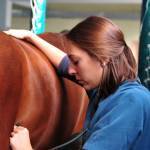Study: Don’t Restrict Feed Prior to Elective Surgical Procedures in Horses

Many, if not most, surgical facilities fast horses prior to elective surgical procedures. The rationale is simple: fasting empties the large colon and decreases the pressure put on the diaphragm and chest while the horse is under anesthesia. While this may make sense in theory, there is little to no scientific data clearly demonstrating that a short fast prior to surgery improves ventilation or other anesthetic parameters. Further, sudden feed restrictions in horses may have negative effects such as colic.
“Postoperative colic occurs in about 3-11% of anesthetic cases, representing a mortality risk and adding to the overall expense of the surgical procedure,” said Ashley Fowler, Ph.D., a nutritionist for Kentucky Equine Research.
In an effort to better understand the effect of preanesthetic fasting on anesthetic parameters and postoperative colic, Colorado State University veterinary surgeons conducted a study using client-owned horses presenting for elective orthopedic surgeries.* Horses were prospectively enrolled in this study and either fasted or fed. Horses that were fed were offered hay continuously until one hour prior to anesthesia, then offered hay again beginning 30 minutes after recovery. Fasted horses had hay removed beginning 10 hours before surgery and were slowly refed beginning two hours after surgery for the next 12 hours before resuming normal hay consumption. Half of the fasted horses were also muzzled to ensure they did not consume straw bedding.
Various anesthetic variables were assessed (e.g., oxygenation and blood pressure), as well as time to first manure production, amount of manure produced, and signs of postoperative colic.
Key findings were:
- Manure output was reduced in all horses postoperatively; however significantly less manure was produced in horses that were fasted prior to anesthesia;
- Time to first manure passage was significantly longer in fasted horses;
- Postoperative colic was observed in 4 of the 30 fasted horses (13%) but 0% of the fed horses. That difference, however, was not statistically significant; and
- No significant differences in oxygenation or blood pressure were noted between fed and fasted horses.
“Other studies show that delayed passage of feces postoperatively increases the risk of colic. In this study, fed horses passed manure earlier than fasted horses. This could be due to the positive effects of chewing on gastrointestinal transit times or due to colonic motility stimulated by stomach stretch after a meal, called the gastrocolic reflex. Alternatively, faster manure passage could be simply due to the presence of more digesta in the gastrointestinal tract,” Fowler said.
The surgeons further suggested that it is also possible that the stress associated with feed restriction may directly decrease gastrointestinal transit times.
Based on the results of this study, this group of veterinary surgeons changed their recommendations and, according to the study, now recommend allowing horses to have continuous access to feed in the perioperative period.
It was also noted that fasting horses can decrease gastric pH in the face of sudden feed restriction.
“Even if horses are not fasted before surgery, feed intake may still be decreased around the time of surgery. Further, providing a product that supports the entire gastrointestinal tract would be beneficial during this time. RiteTrac contains stomach coating agents and fast-acting buffers to protect the gastric tissue from a decrease in pH. This product also contains a time-released buffer to help stabilize the large intestinal pH,” Fowler shared.
*Barton, C.K. R.C. Hector, D.A. Hendrickson, C.E. Kawcak, B.B. Nelson, and L.R. Goodrich. 2024. Fasting horses perioperatively decreases manure production and increases time to manure output postoperatively: a controlled randomized trial. Journal of the American Veterinary Medicine Association 12:1-8.








